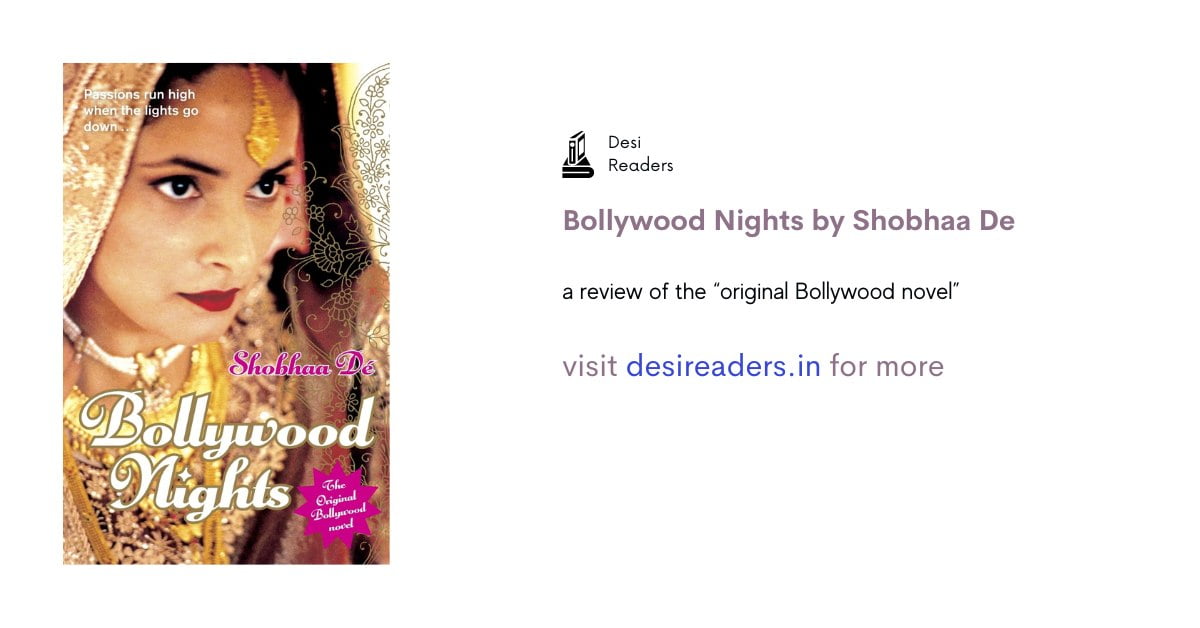Bollywood Nights by Shobhaa De – Book Review
Here is a snippet of the novel Bollywood Nights by Shobhaa De:
- Title: Bollywood Nights (Originally published as “Starry Nights” in India)
- Author: Shobhaa De
- Publication Date: 2007, April 5 (New Edition)
- Page: 368
- Publisher: Penguins
- Genre: Fiction, explicitly focusing on Bollywood, social commentary, and drama
- Themes: Exploitation in the film industry, ambition, survival, moral decay, and the dualities of elite social life.
- Main Characters:
- Aasha Rani: A starlet pushed into the industry by her ambitious mother, facing the harsh realities of Bollywood.
- Akshay Arora: A manipulative film producer.
- Raja: A young aspiring actor and Aasha’s friend.
- Karan Malhotra: A director with integrity who represents the romantic side of the industry.
- Setting: The film is set primarily in Mumbai, with scenes also set in New Zealand. It reflects the protagonist’s journey from Bollywood to a new life abroad.
- Narrative Style: Known for its sensationalism and direct approach, reflecting the film industry’s fast-paced and often brutal reality.
- Reception: Mixed reviews; praised for its bold exposure of Bollywood’s underbelly but critiqued for its literary style and character depth.
- Cultural Impact: Significant for its critique of Bollywood’s practices, especially regarding the treatment of women and the industry’s moral fabric.

Shobha De has carved a niche for herself in the literary world with her unapologetic portrayal of the elite’s social dualities, often showcasing the stark contrasts within the upper echelons of society through her novels. Her works are celebrated for their harsh realism, where she doesn’t shy away from depicting the luxury and the moral decay that often accompany wealth and power. Through her narratives, De explores the lives of the rich and famous, peeling back the layers of glamour to reveal the underlying struggles, hypocrisies, and the often brutal realities of maintaining status. This approach not only entertains but also critiques the societal norms that govern these circles, making her a significant voice in discussing the complexities of elite life in contemporary India.
Shobhaa De’s “Bollywood Nights” is a controversial yet compelling narrative that delves into the underbelly of Bollywood, India’s colossal film industry. While the novel might not be celebrated for its literary finesse, it captures attention for its raw portrayal of ambition, exploitation, and survival within cinema’s glitzy yet grim world.
Narrative Structure and Style:
De’s writing in Bollywood Nights departs from traditional literary aesthetics, opting for a more direct, almost journalistic approach. The prose, while straightforward and at times sensational, effectively mirrors the fast-paced, often brutal reality of the film industry. The narrative structure, though linear, is enriched with flashbacks and character reflections, adding depth to the protagonist, Aasha Rani, and her transformation from innocence to a hardened survivor.
Characterisation:
Aasha Rani’s character is the most scrutinised element of the novel. De crafts her as a symbol of the industry’s exploitation, where innocence is quickly traded for survival. Critics might argue that Aasha’s development lacks depth, portraying her more as a victim than a character with agency. However, this could be interpreted as De’s critique of the system where personal agency is often an illusion. The supporting characters, like Akshay Arora and the various men Aasha encounters, are sketched with broad strokes, representing types rather than individuals, which might be seen as a weakness in character development but highlights the systemic issues within Bollywood.
Other significant characters in “Bollywood Nights” include Akshay Arora, a powerful film producer who epitomises the exploitative nature of Bollywood, manipulating and controlling aspiring actresses like Aasha; Raja, a young aspiring actor and Aasha’s friend, whose experiences offer a male perspective on the industry’s challenges; Karan Malhotra, a director known for his integrity, whose complex relationship with Aasha underscores the tension between genuine talent and the industry’s corrupt practices; and a host of various Bollywood figures, from established stars to struggling newcomers, each adding depth to the portrayal of the film industry’s culture.
Themes and Social Commentary:
The novel’s strength lies in its unflinching exploration of themes like exploitation, the commodification of women, and the power dynamics in Bollywood. De’s portrayal of casting couch scenarios, the manipulation of young talents, and the transient nature of fame offers a grim commentary on an industry often idolised. Here, De’s courage shines through; she doesn’t shy away from exposing the dark truths, making ‘Bollywood Nights’ a significant social commentary rather than just a novel.
Cultural and Industry Reflection:
“Bollywood Nights” can be seen as a mirror held up to Bollywood, reflecting its glamour and shadows. The novel’s setting in the late 20th to early 21st century captures Bollywood transitioning from its golden era to a more commercial, globalised entity. De’s narrative touches on how this transition affects the industry’s moral fabric, making it a valuable document for cultural studies on Bollywood’s evolution.
Despite its literary shortcomings, “Bollywood Nights” has been recognised for its cultural impact. It scritiquesBollywood’s moral fabric, making it a valuable document for cultural studies on Bollywood’s evolution. The novel’s depiction of the industry’s exploitation has sparked discussions on the treatment of women in Bollywood, adding to its significance beyond literature.
Critical Reception and Literary Value:
From a literary standpoint, the novel might be critiqued for its lack of subtlety or for its characters that sometimes feel like caricatures of Bollywood stereotypes. However, its value lies in its narrative courage. De’s work might not be for those seeking literary beauty but those interested in understanding the undercurrents of a society obsessed with cinema. The novel’s reception has been mixed on the expected lines, with some lauding its boldness and others decrying its sensationalism. Shobhaa is a landmark of sensationalism. Those who read contemporary literature are well aware of this truth. However, at the same time, she might seldom barter bold truths or sensational revelations for a sophisticated plot or literary accolades! She is the insider in Bollywood and has the guts to expose the industry for its shallow morality and pretentious campaigns for equality, women empowerment, and gender justice.
Ideal Readers:
Shobhaa De’s work, “Bollywood Nights,” would appeal to readers interested in the behind-the-scenes dynamics of Bollywood, cultural critics studying Indian society and gender issues, feminist readers examining the exploitation of women in the film industry, fans of celebrity gossip and sensational narratives, those seeking bold and controversial themes, casual readers of Indian English literature, individuals keen on understanding Bollywood’s evolution, and critics of the entertainment industry’s practices. While it might not cater to all tastes due to its explicit content and narrative style, it offers a provocative look at the darker side of fame, making it a significant read for those intrigued by the intersection of ambition, morality, and the film industry.
Conclusion:
The present book by Shobhaa De might not be a novel that literary purists would celebrate for its prose or character depth. Yet, its significance must be recognised in the context of cultural critique and industry exposure. De’s novel, with its gritty realism, serves as a wake-up call, a narrative that dares to peel back the layers of glamour to reveal the harsh truths beneath. For scholars of Indian cinema, sociology, or gender studies, “Bollywood Nights” remains a text worth engaging with, not for its literary merits but for its bold exploration of Bollywood’s darker side.
Alka for Desi Readers
Bollywood Nights by Shobhaa De – Book Review
- Critical Review
Summary
It is a novel that exposes the ill-industrialised version of exploitation normalised by Bollywood insiders and even the audience. Critics may discredit the novel for its lack of substantial depth and dried aesthetics, and it does lack those; one cannot deny the novel its fair share of portraying an accurate picture with stark realism.
